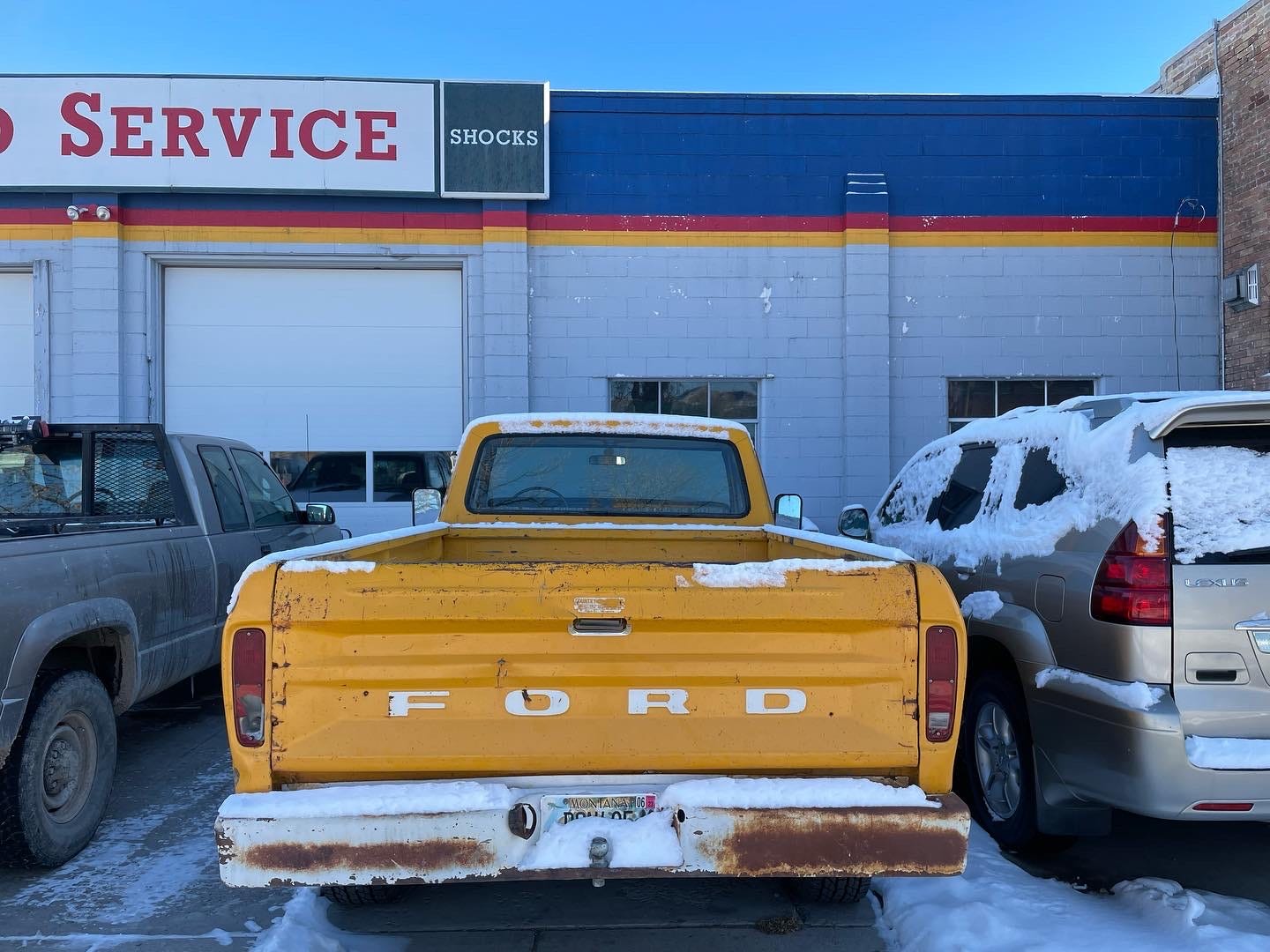It hasn’t been a good year for our trucks. In April the clutch on our 1998 Tacoma gave out just past La Bajada south of Santa Fe. (“The worst I’ve ever seen”, Carlos at Toy Auto Man later told me, showing me what remained of the friction plate with a grimace.) In May the fuel injection pump on our 1991 Toyota Pickup failed; in June a blade on the radiator fan snapped off, taking out the radiator as it went. Then came a few months of regular trips to Super 6 Tokyo in Albuquerque to troubleshoot a power steering fluid leak. We’re now in Montana, where a spell of subzero temperatures last week proved too much for the battery. “Why don’t you sell it and buy a car that starts in the cold?”, Kate’s 13-year-old goddaughter Neva asked us, clearly baffled.
I had to admit it was a reasonable question. “[Old] cars should not be driven any more than sixty-year-old men should play football” writes Rick Bass in Winter, going on to explain that’s why he does it anyway. Rereading this passage two nights ago I laughed out loud with recognition, both at his stubbornness and the way he fails to really convince you. The best reason I have for not owning something made after the turn of the century is that new cars cost a lot of money. After that, I stumble, struggling to justify repeated inconvenience in rational terms. More often than not I land on my desire to avoid the environmental impact of manufacturing a new vehicle. Few consumer purchases are as resource intensive as an automobile, and maintaining something you already own is always the greenest choice. Right?
Carbon accounting undercuts the strength of this argument. Controlling for vagaries of build and power grid, the high initial CO2 footprint of a new battery electric vehicle falls below the output of a new gas powered vehicle somewhere around the 13,500 mile mark, or after roughly a year of average driving. For a used car—its own production emissions now a moot point—the figure rises to two years; more with infrequent use. In the grand scheme of things I drive rarely, with no regular commute and many of my needs met on foot or bike. Nonetheless, it’s clear there is no strong climate case for holding out on a Bolt or Leaf long-term, especially given intangibles like the need for rapid mass adoption. Where things get complicated is that there are many other social and environmental cases to make. What is it worth to avoid driving a lithium mine boom in Bolivia or southeast Oregon? For me, quite a bit.
The obvious problem with all of this is that there is no world in which widespread personal vehicle ownership of any kind is sustainable. The small minority of us in the privileged position to choose already bear a disproportionate responsibility for a hotter, dirtier planet. This isn’t exactly our fault. In North America we are both beneficiaries of plundered affluence and prisoners of the expectations of the economic and social system that ferried it to us. Even when public transit or family can meet your transportation needs, opting out of car culture marks you as poor, or dependent, or an anachronism—all damning categories in our culture. My years of getting around by bus and bicycle were similar to my years without a cell phone in that I often felt like I was a curiosity or an inconvenience to others. Those years were in my early 20s, in cities and cohorts where this was not unusual. I can’t imagine what it would be like as a single mom in Lubbock.
Of course, we make decisions on the basis of more than environmental arithmetic. Operating a manual transmission in a cab without digital displays is a rare source of analog pleasure, and owning something you can fix without a computer is an aesthetic consideration as much as a practical one. The rumble of a combustion engine built three decades also lets you sustain few illusions about driving in a way I find valuable. It’s a nudge to avoid doing so whenever possible, and a reminder that we cannot consume our way out of a crisis. Besides, repairing things as a matter of course is a way of looking at the world as much as it is anything else. What does it mean to have an ethical relationship with an object? We’ve thawed out in Missoula, and the ‘91 is running fine. I still think it’s time to get the starter looked at.



"In North America we are both beneficiaries of plundered affluence and prisoners of the expectations of the economic and social system that ferried it to us. " Well phrased!
Thanks for sharing Ethan! Tony and I talk about the concept of and costs associated with newer/greener vs. repair/reuse a lot. Last fall, we bought a 2003 Chevy Express van that had already been built out with the intention of selling both of our cars and making that our only vehicle. We don't drive very much in town as it is and I'd also like to have a bit more incentive to rally to take the bike even in poor weather. Relatedly, if we do need another "vehicle" we'd hope to retrofit an existing bike with a motor to make a DIY e-bike build that could be stripped back down to the original frame. For me, the issue with repairing what you have is simply making the time, something I hope to do more of this year.